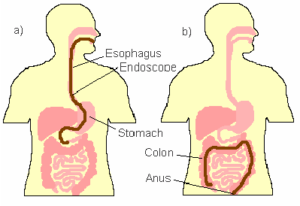What is UGI Endoscopy?
UGI endoscopy, also known as upper gastrointestinal endoscopy or esophagogastroduodenoscopy (EGD), is a procedure used to examine the upper part of the digestive system. This includes the esophagus, stomach, and the first part of the small intestine (duodenum).
Purpose of UGI Endoscopy
UGI endoscopy is primarily used to diagnose and sometimes treat conditions such as:
- Gastroesophageal reflux disease (GERD)
- Ulcers
- Celiac disease
- Esophageal varices
- Inflammatory conditions like gastritis
- Tumors or cancer in the upper digestive tract
- Swallowed objects
The Procedure
During a UGI endoscopy, the patient is usually sedated. A thin, flexible tube with a camera and light at the end (endoscope) is inserted through the mouth and gently guided down the throat. This allows the doctor to view the lining of the upper GI tract in detail. The procedure typically takes about 15 to 30 minutes.
Preparation for UGI Endoscopy
Preparation for a procedure usually involves fasting for 6-8 hours before the procedure. This ensures that the stomach and duodenum are empty, providing clear visibility for the endoscope. Patients may also need to stop certain medications, as instructed by their doctor.

What is a Colonoscopy?
A colonoscopy is a procedure used to examine the lower part of the digestive system, specifically the large intestine (colon) and rectum.
Purpose of Colonoscopy
Colonoscopy is primarily used to:
- Screen for colorectal cancer
- Diagnose the cause of unexplained changes in bowel habits
- Identify causes of abdominal pain, rectal bleeding, and chronic diarrhea
- Monitor inflammatory bowel diseases like Crohn’s disease and ulcerative colitis
- Remove polyps or other abnormal growths in the colon
The Procedure
During a colonoscopy, doctors usually sedate the patient. They insert a long, flexible tube with a camera and light (colonoscope) through the rectum and gently advance it through the colon. This allows the doctor to view the entire length of the colon. The procedure typically takes about 30 to 60 minutes.
Preparation for Colonoscopy
Preparation for a colonoscopy is more involved than for a UGI endoscopy. It usually requires:
- A clear liquid diet for one to three days before the procedure
- Bowel preparation with strong laxatives the day before the procedure to clear the colon
- Avoidance of certain medications, as advised by the doctor
Key Differences Between UGI Endoscopy and Colonoscopy.
- Target Areas: UGI endoscopy examines the upper digestive tract (esophagus, stomach, duodenum), whereas colonoscopy examines the lower digestive tract (colon and rectum).
- Purpose: UGI endoscopy is used to diagnose and treat conditions affecting the upper GI tract, while colonoscopy is primarily used for screening and diagnosing issues in the lower GI tract, particularly colorectal cancer.
- Preparation: Preparation for a Endoscopy involves fasting, while colonoscopy preparation requires a more rigorous bowel cleansing process.
- Procedure Time: Endoscopy generally takes less time (15-30 minutes) compared to colonoscopy (30-60 minutes).
Risks and Benefits
Both UGI endoscopy and colonoscopy are generally safe procedures with low risk, but they do carry some potential risks such as:
- Perforation of the GI tract
- Bleeding
- Reactions to sedation
However, the benefits of these procedures far outweigh the risks. They provide essential insights into GI health, enable early detection and treatment of serious conditions, and significantly contribute to preventive healthcare.
Post-Procedure Care
After UGI endoscopy, patients may experience a sore throat, bloating, or mild cramping. These symptoms typically resolve quickly.
After a colonoscopy, patients may feel bloated or have some cramping due to the air introduced into the colon during the procedure. Patients commonly pass gas as they expel the air. Doctors usually send any polyps removed during the procedure for biopsy, and results typically become available within a few days.
When to Choose UGI Endoscopy vs. Colonoscopy
Your doctor will recommend either UGI endoscopy or colonoscopy based on your symptoms and medical history. Here are some general guidelines:
- Choose UGI Endoscopy if: You have symptoms like chronic heartburn, difficulty swallowing, unexplained weight loss, or upper abdominal pain.
- Choose Colonoscopy if: You are over 50 (or earlier if you have a family history of colorectal cancer), experience changes in bowel habits, rectal bleeding, or unexplained lower abdominal pain.
Conclusion
Understanding the differences between UGI endoscopy and colonoscopy is crucial for making informed decisions about your health. Both procedures are invaluable tools in the diagnosis and treatment of gastrointestinal disorders. By knowing what each procedure entails, their purposes, and how to prepare, you can approach these diagnostic tests with confidence and ensure optimal care for your digestive health.
For more detailed information or to schedule an appointment, consult your gastroenterologist. Regular screenings and timely diagnostic tests are key to maintaining good digestive health and preventing serious conditions.
